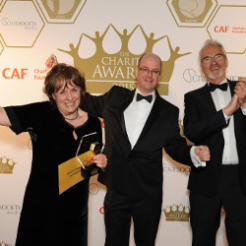The Howard League for Penal Reform won a Charity Award last year for its Books for Prisoners campaign that successfully reversed the government's ban on prisoners being given books in jail. Andrew Neilson relates the story.
When our chief executive Frances Crook, accepted the 2015 Charity Award for ‘Advice, support and campaigning’, she said it was “almost like the Oscars”. And for charities both large and small, the Charity Awards do indeed offer an exciting opportunity to seek recognition for the important work that we do.
The Howard League for Penal Reform was honoured for its work on the Books For Prisoners campaign, which has been described variously to us by others as “brilliant”, “amazing”, “textbook”. Richard Hawkes of Scope, one of the judging panel, described it as having “every aspect you could want from a campaign”. Yet Books For Prisoners almost wasn’t a campaign at all.
It started in March 2014 as a blog by Frances, explaining how a ban on friends and families sending prisoners parcels had in effect imposed practical restrictions on prisoners reading books. Thanks primarily to the writer Mark Haddon and his enthusiastic tweeting, that blog went viral over the weekend it was published. I left work the Friday before having no campaign and walked into the office on Monday morning with the realisation we had a potentially huge opportunity on our hands – virtually conjured from thin air. The challenge was how to capitalise on that.
In the first week alone a letter was sent to the Daily Telegraph from many of the country’s leading authors, corralled together by Mark Haddon (who appeared on the Today programme and routed the prisons minister with an articulate deployment of the facts). The Howard League encouraged supporters to tweet ‘shelfies’ to the Ministry of Justice and thousands of them did. With the then-Justice Secretary Chris Grayling rocking on his heels in the face of international media coverage and constantly changing the rationale for his restrictions, the Poet Laureate, Carol Ann Duffy, contacted Frances and suggested we organise a poetry reading outside a prison. Hence on the Friday of that week we staged ‘The Ballad of Not Reading in Gaol’ (title provided by the actor Sam West, or as he tells it a friend of his) outside Pentonville prison and earned yet more media coverage over the weekend.
What followed that frenetic first week was a frenetic nine months of more campaigning. The Howard League was joined by many supporters and allies – from figures in the publishing world, who staged a fundraiser for us, to other charities such as the Prisoners Education Trust, who provided evidence of the book restrictions’ impact on prisoners and their learning. The most prominent of these allies was English PEN, who mobilised former prisoners of conscience and helped us practically as many of the authors amongst their membership were keen to lend their support too. This led to a letter to the Prime Minister (as justice ministers would not meet with us) and a demonstration outside Downing Street.
The Howard League also staged a silent protest at a select committee hearing and prepared a Christmas visit to the Ministry of Justice from Santa, along with hundreds of books donated by our members. At the same time a brave solicitor, Sam Genen, had taken the campaign to the courts and successfully challenged the restrictions. An open letter from Chris Grayling to Carol Ann Duffy in that first week of the campaign proved crucial to the judgment.
Such was the success of the campaign that after the 2015 general election, practically the first act of new Justice Secretary Michael Gove was to completely reverse the restrictions. I even received a call from the Ministry of Justice to tell me about it beforehand.
For the Howard League’s work on Books For Prisoners to be recognised in the Charity Awards was phenomenal. It was inspiring to hear about the other winners and shortlisted charities on the night, from the amazing work of overall winner Lumos to our fellow criminal justice winner Blue Sky, an employment agency for ex-offenders. We’d like to think the award also recognised the importance of charities like the Howard League and our role as independent campaigners. The backdrop to Books For Prisoners was a range of assaults on charities and their freedom to campaign by government ministers – including from Chris Grayling himself.
I’d urge charities with projects and campaigns to shout about to enter the 2016 Charity Awards. It’s a great occasion and a fabulous celebration of all that’s best about our civil society.
Andrew Neilson is director of campaigns at the Howard League for Penal Reform








